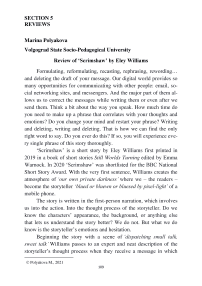Review of 'Scrimshaw’ by Eley Williams
Автор: Polyakova Marina
Журнал: Тропа. Современная британская литература в российских вузах @footpath
Рубрика: Reviews
Статья в выпуске: 14, 2021 года.
Бесплатный доступ
Короткий адрес: https://sciup.org/147235578
IDR: 147235578
Текст статьи Review of 'Scrimshaw’ by Eley Williams
Formulating, reformulating, recasting, rephrasing, rewording… and deleting the draft of your message. Our digital world provides so many opportunities for communicating with other people: email, social networking sites, and messengers. And the major part of them allows us to correct the messages while writing them or even after we send them. Think a bit about the way you speak. How much time do you need to make up a phrase that correlates with your thoughts and emotions? Do you change your mind and restart your phrase? Writing and deleting, writing and deleting. That is how we can find the only right word to say. Do you ever do this? If so, you will experience every single phrase of this story thoroughly.
‘Scrimshaw’ is a short story by Eley Williams first printed in 2019 in a book of short stories Still Worlds Turning edited by Emma Warnock. In 2020 ‘Scrimshaw’ was shortlisted for the BBC National Short Story Award. With the very first sentence, Williams creates the atmosphere of ‘our own private darkness’ where we – the readers – become the storyteller ‘blued or bluewn or bluesed by pixel-light’ of a mobile phone.
The story is written in the first-person narration, which involves us into the action. Into the thought process of the storyteller. Do we know the characters’ appearance, the background, or anything else that lets us understand the story better? We do not. But what we do know is the storyteller’s emotions and hesitation.
Beginning the story with a scene of ‘dispatching small talk, sweet talk’ Williams passes to an expert and neat description of the storyteller’s thought process when they receive a message in which
they get to know that their partner is ‘ unhappy’. Trying to find the right word to support the partner the storyteller begins to reflect on different communication and moral issues. How to ask about ‘ the cause of unhappiness ’ without exacerbating it. How to think properly understanding that someone is ‘waiting for your message to materialise’. To comment or not to comment a link that you send in order to distract from the unhappiness. Can we really ‘be in control of another person’s feelings' ? How to abide the waiting for the reply to your own message.
Williams dwells on the storyteller’s persistent anxieties about communication and miscommunication. The choice of words and the choice of word order are so amazingly precise in every sentence of the story that you think as if that is you, the reader, who is trying to express your own mind and mood. ‘I couldn’t ask’, ‘I couldn’t tell’, ‘I couldn’t comment’ – full of repetitions and syntactical parallelism the story acquires a unique rhythm of fevered thinking. With the storyteller, you consider the difference between synonyms for ‘unhappiness’ given in alphabetical order ‘so not to imply the storyteller’s own personal hierarchy in terms of the terms’ . With the storyteller, you try to find out ‘a clear idea of the word walrus’ etymology’ . Together with the storyteller, you get genuinely overwhelmed at the end of the story.
The minutes of reading are collapsing and stretching at the same time when you are trying to find the way out of the problems described here. Read this story. And maybe you’ll find the answer.
Список литературы Review of 'Scrimshaw’ by Eley Williams
- Williams E. ‘Scrimshaw' Still Worlds Turning. No Alibis Press, 2019.


